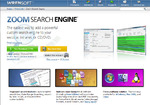Adding a Search engine to your website
 Friday, May 2, 2014 at 7:54PM
Friday, May 2, 2014 at 7:54PM  Alan W
Alan W So long, Atomz Search
Most web sites of any size have a local Search box that lets you, erm, search for a particular term or phrase. Without running a bespoke Search script or database-driven site of your own, the options for owners of smaller websites wanting to add a Search are a bit limited.
In the past, as an off-the-peg solution I used a handy search engine script from Interactive Tools which allowed some simple styling of results to make it match the website. Some useful stats showed popular search terms and it worked pretty well. Unfortunately Interactive Tools no longer sell it although legacy documentation is still available here for those sites still running it. (One local Government site asked me for help in fixing a permissions problem, easily sorted).
My EPE website used a simple but effective free search from Atomz, a popular and much-loved freebie that was server-based (theirs not ours), so Atomz faithfully crawled the website and then churned out search results on demand. Atomz has been around for donkeys years but sad to say, Atomz suddenly disappeared in March 2014 and broke the EPE web site search function. It’s said that the current über-owners Adobe pulled the plug on Atomz without as much as a by-your-leave. Another popular search site, PicoSearch, has also sunk without trace.
With choices gradually closing down, I looked at one or two free Search engines that are still available. Freefind.com offers a basic free service as well as Pro versions, and they claim over 100,000 sites use it. Document and PDF indexing is also available. Its pricing plans are available here http://www.freefind.com/plans.html
 Zoom by WrensoftMore interesting is Zoom from Wrensoft, which works differently: software running on your desktop reaches out and indexes the target website in question. Or, it can search a mirror of the files stored locally on hard disk. Either way, the results are index files that have to be uploaded onto the website using Zoom’s built-in FTP client. The website Search function then interrogates the index file that you created offline. Should you update your website, the software update has to be run again and a new file is FTP'd.
Zoom by WrensoftMore interesting is Zoom from Wrensoft, which works differently: software running on your desktop reaches out and indexes the target website in question. Or, it can search a mirror of the files stored locally on hard disk. Either way, the results are index files that have to be uploaded onto the website using Zoom’s built-in FTP client. The website Search function then interrogates the index file that you created offline. Should you update your website, the software update has to be run again and a new file is FTP'd.
Zoom claims it can also search local intranets, CDs or DVDs, and it searches popular file formats (PDF, doc, etc) too. Downloadable search logs offer local analysis and reporting in Zoom. The product is free for personal websites up to 50 pages, or the Pro version costs $99. Enterprise is $299 to buy.
Zoom is a very interesting-looking product if you don’t mind the idea of controlling the spidering and uploading a file from your desktop. To add a Search facility to a CD or DVD (eg a product catalogue) though, Zoom sells the extra Flying Ant Web Server for another $99 per licence. So if you want to make a disk-based ebook (or eg website on a disk) consider html.exe. It runs in its own browser on CD, has a built-in search and I have used this successfully on several projects. It costs from €46 to €140 for the commercial version.
The obvious alternative for adding Search to a website is using Google Custom Search. Indexing can be dedicated to a URL and it's free for sites up to 200 web pages. Of course, Google spiders your website remotely and you simply embed some HTML onto your webpages. Starting from $100 per year, web sites up to 20,000 searches a year can be handled. A custom logo can be added to results and basic customisation is available. If you want to use Custom Search, Google complicates things with a multitude of URLs but you can add Google Custom Search using Google CSE, Google Webmaster Tools or even via an AdSense account. That’s probably the best route for most small website owners.


Reader Comments